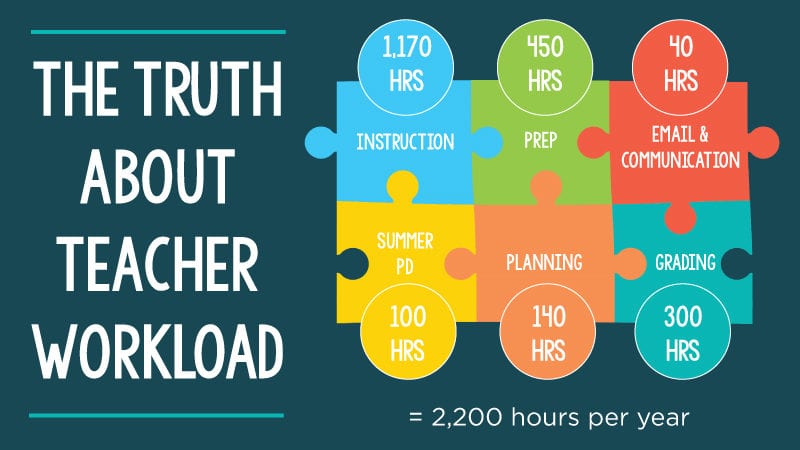As teachers, we hear the comments every year.
“It must be nice having summers off.”
“I wish I had teacher hours.”
“Being a teacher is like working part time.”
Of course, none of these are true. Most teachers are signing contracts for 180 days of work every year, so at first glance, it might look like it’s a sweet summers-off gig. But nearly all teachers (including me) will confirm that they work a lot, LOT more—and we are not paid for that work.
So just how many hours do teachers actually put in each year? Despite my fear of math (I’m an English teacher), I thought I’d dive in and take a look at my personal number of work hours each year. This is based on a typical 180-day/39-week teacher contract.
Hours of Instruction in the Classroom: 1,170

Every school is different, but for the most part, teachers are in the classroom for about six hours a day. Personally, I have a 25-minute lunch, but this is usually spent with students as they make up work or use my classroom as a quiet space. I know this is true for most teachers, so for tracking purposes, I’m keeping it at six hours a day.
To compare these hours with a private sector job, these 1,170 hours in a classroom are roughly about 29 working weeks for a typical 40-hour-a-week job.
But wait! There’s more!
Hours on Classroom Prep, Planning, etc.: 450

There’s an old adage, “If you are five minutes early, you are already 10 minutes late.” This couldn’t ring truer for teachers. Most contracts ask teachers to be in school five minutes before class begins. However if you ask any teacher who is in a classroom, they’ll likely tell you that if you don’t get to school an hour early, you can forget about being ready for the day.
There’s no way you’ll get access to the photocopier before it runs out of paper or, even worse, toner! Most teachers begin their day an hour before the students show up. This is the calm before the storm, when we can arrange desks, make copies, write out our boards, and have those last few precious, quiet moments.
Also at the “end” of the day, you’ll frequently see school parking lots full of cars, anywhere from one to three hours after the final bell. Why? Teachers are busy with after-school help, meetings, clubs, sports—the list is never-ending. For this section, I estimate it’s between 300 and 600 extra hours, so we’ll estimate that it’s somewhere right in the middle, 450 hours.
[contextly_auto_sidebar]
Hours of Grading Outside of the Classroom: 300

I love teaching. Grading? Not so much. There have been plenty of times when my family has found me pounding my head on my desk, asking why I assigned so many written assessments. (The bottom line is that they help my students grow and become fully ready for college or career, but I digress.)
I did the math for this section, showed it to my husband, and he laughed. He said my estimates were far too low. So I went back to the drawing board, with his observations in mind. Now I know this section can vary a great deal based on grade or subject, but I’m estimating that teachers spend between five to 10 hours a week on grading. My number is closer to between 500 and 600 hours because I’m an English teacher. But I’m going to keep this at 200 total hours for most teachers.
Hours of Planning Outside of the Classroom: 140

I don’t like grading, but do I ever love planning! There’s nothing like a perfectly planned lesson.
I tend to save my planning to Sundays, and I spend a few hours on it each week. I can imagine that the subject, grade, or place you teach might affect these hours as well. If you’re a kindergarten teacher, for instance, you might spend 300 hours planning versus 100 grading. But let’s average this at about three hours a week for most teachers, making it another 120 hours for the year.
Then let’s also add in about 20 hours for this time during vacation. I’m not talking about summer vacation (yet). I’m just talking about the typical fall, winter, and spring breaks. You know those times when everyone assumes we teachers sit back and relax? Sure there is some of that, but the planning and grading don’t stop during this time.
Hours Spent on Summer PD: 100

All my non-teacher friends ask me all summer, “Are you enjoying your time off?” As nice as it is to have stretches of availability during the summer months, there’s a lot of PD rolled into there as well. This summer, I’ve already been up to my neck in PD and trainings.
I think I missed the memo about teachers getting summers off, as did many of the teachers I know. I have 64 hours scheduled in my last two weeks of “summer break” alone. Between meetings, PD opportunities, and special trainings, it really adds up. And this is not counting drive time. All in all, I ended up with 146 hours this summer. I’m going to average this to about two and a half weeks of PD for most teachers, putting in about 100 hours each summer.
Hours Spent on Email and Other Communication: 40

This includes all the emails from students and parents that I receive during the summer or weekends, not to mention the phone calls. If I worked in an office, I’m sure they would be considered billable hours, but I don’t track those very well.
Honestly when I have families who are invested in their child’s education, I’m so excited that it doesn’t feel like work! Still, it is work. So let’s estimate that teachers spend at least an hour or two each week on communication, a total of about 40 hours.
So where does that leave us?

Our grand total is 2,200 hours, or 42 hours a week, working year-round. (This is more than most full-time employees.)
Of course, I realize that many people with 40-hour-a-week jobs take work home or work more than their 40 hours. But remember, again, that teachers’ contracts aren’t actually for 12 months a year. Contracts are usually for 39 weeks, or around 180 days. Yes, we’re working full-time jobs while getting part-time pay.
I’m not trying to be cranky about teaching or even compare our jobs to the rest of the world. What I’m trying to show is that teachers work more than the time outlined in their contracts. And having summers off? That’s basically a myth. So let’s all work to give teachers a little more respect. They definitely deserve it.
How much teacher overtime do you put in? Share in the comments or in our WeAreTeachers HELPLINE group on Facebook.
Plus, check out 11 surprising statistics that sum up the life of a teacher.


